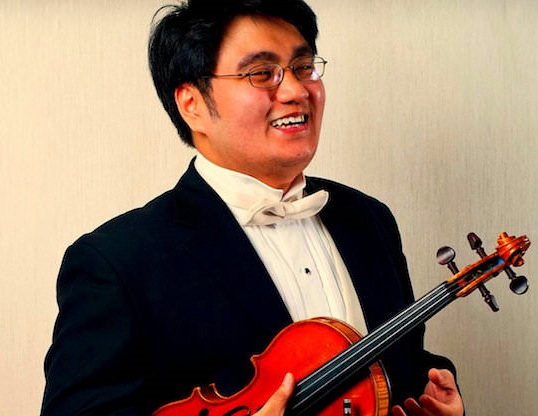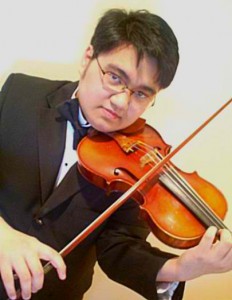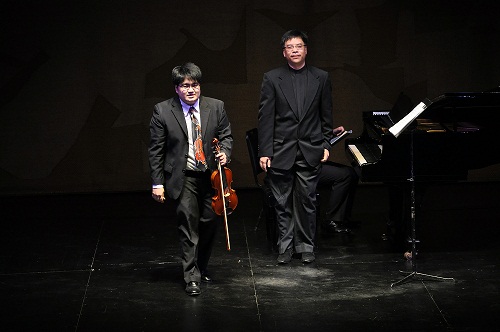Violinist Diomedes Saraza, Jr. reaches a full musical cycle when he reprises the Sibelius violin concerto as soloist of the Philippine Philharmonic under the baton of Chinese conductor Haoran Li.
His engagement is on Friday, February 24, 8 p.m. at the Manila Metropolitan Theater.
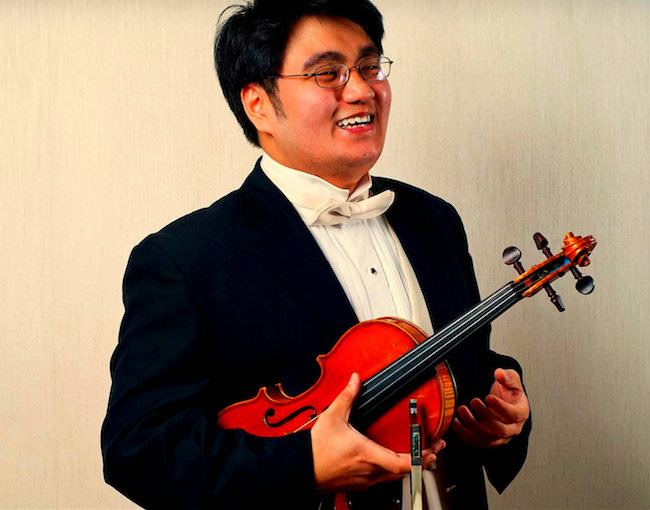
The Sibelius warhorse was the same concerto he played during his Carnegie Hall debut with the PPO in 2016 sharing the stage with pianist Cecile Licad.
Twice he played it under two PPO conductors: the French-American Oliver Ochanine and the Japanese Yoshikazu Fukumura.
He triumphed in both engagements, making fresh understatements which showed his rare kind of musicality.
So much so that he has learned to treat the concerto as a long-time friend. “I am very excited to play it again. I’m glad I will have to opportunity to work on this masterpiece once again.”
One of the few times he played it was during his Carnegie Hall debut in 2016. He opened the program and earned an ovation with Cecile Licad as the finale with Rachmaninoff Piano Concerto No. 2.
Carnegie Hall gave him a lot of beautiful memories.
It was one of few memorable times when his older brother and parents were in the audience in the biggest moment of his career. “I remember the energy of the audience, the magical acoustics of the hall and the pride of standing on stage with our national orchestra. It really felt like a big Filipino family reunion with many Filipinos in the audience.”
What makes the Sibelius concerto pretty tough for soloists?
“It’s no doubt technically demanding. But beyond technique is the mental focus and big strong emotional capacity that is needed,” he said.
One’s first early encounters with Saraza was as a very young recitalist in the opening of the Pasig Museum Summer Music Festival series in 2002. He dazzled with Saint Saens’ Introduction et Rondo Cappicioso and a magical rendition of Abelardo’s Cavatina.
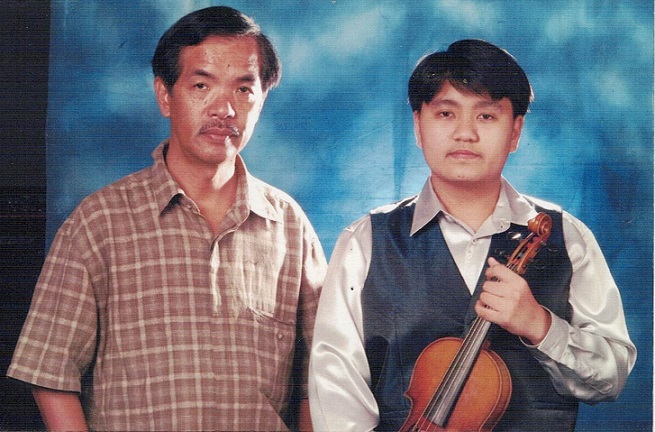
After winning a NAMCYA competition, he was off to New York in the Mannes College Preparatory Division under the tutelage of violin pedagogue Dr. Chin Kim.
It wasn’t long when he also won the Mannes Concerto Competition giving him the opportunity to a performance with the Mannes Philharmonic under the baton of Michael Adelson. As expected, he became concertmaster of the Mannes Philharmonic.
His talent came to the fore performing with the New York Symphonic Arts Ensemble at Julia Richman Auditorium in New York.
Sooner than he expected, he was a prizewinner of the Juilliard Schools’ William Schuman Competition.
He summed up his Juilliard years thus: “Studying in that school taught me how to be self-sufficient and never to be complacent. You always have to work hard on mastering your craft.”
In Manila, his homecoming concerts were always reasons for celebrations.
His Paganini D Major Concerto with the Manila Symphony at the Philamlife Auditorium was electrifying.
His key to a good performance: “Focus consistently during the concert no matter what happens. All the things that you have practiced must stay in the performance. The most difficult part of playing this concerto are the notes themselves. They require a huge amount of energy and violin technique. The thing that makes it more difficult is putting the right character on the notes. My teacher used to say that this piece should sound easy and playful even though the notes are hard. You can’t just focus on hitting the notes right because they require from the soloist the right mood and character — not to mention various shapes and color.”
His Mendelssohn and Tchaikovsky concertos with the PPO were equally gratifying.
One recalled his Mendelssohn moments some years back with conductor Fukumura.
On a Friday night, it was raining applause with whistles and cheers ending with standing ovation after an ecstatic CCP audience heard Mendelssohn’s Violin Concerto in E Minor Op. 64 with violinist Diomedes Saraza, Jr. as soloist.
His stunning entrance and execution of the theme found glorious equivalent from the orchestra which more than rose to the occasion.
The first movement cadenza dazzled as it were with its eerie, if, glorious rhythmic shifts with the audience in awe of the soloist’s ricocheting bowing.
There is a soulful moment in the andante movement which the soloist and orchestra defined with infinite grace and solace.
The brisk E major finale farther showed astounding rapport between Saraza and orchestra under Fukumura.
The impact was such the audience found itself cheering as one and later moved to give a standing ovation.
How could one forget his Bartok Violin concerto No. 3 also with MSO which he played shortly after his graduation from Juilliard. It sizzled from beginning to end also eliciting a standing ovation after the last movement.
For now, he enjoys the other role which is concertmaster of the Manila Symphony. “I enjoy the progress and the serious commitment of each player in the orchestra. Being home after many years abroad is another reason, I am happy to be back in Manila.”
He has turned to teaching in between performances. He finds fulfillment in seeing his students getting easy acceptance in good schools abroad. “When I see my students work hard and gets accepted in Juilliard or Hanns Eisler Berlin is rewarding enough.”
Like most musicians who survived the pandemic, he has good reasons to be thankful. “The pandemic definitely made me a better person. It taught me to appreciate every opportunity and moments that we are on stage performing and doing what we love or being with people we love.”
He reviews his regimen as he prepares to rehearse with the PPO — his first time as soloist at the Manila Metropolitan Theater. “I do the same routine as if it’s another regular day. I pray, I take a shower, practice my scales then run some passages then do the dress rehearsal if there is. I just have to make sure I don’t get too mentally and physically drained for the concert at night. Sometimes I nap in the dressing room.”
He has played many times as a concertmaster of MSO at the Met. This return engagement at the Met holds a special meaning to him. “I’m excited because my Dad used to sneak into the old Met to watch concerts when he was a still a jeepney driver. Funny I finally got to be Met soloist there now.”
His musical life is still devoted to lots of practicing whether he is playing with orchestra or solo. “I am also grateful to have the opportunity to teach here in the Philippines. We have so many talented musicians here in our country.”
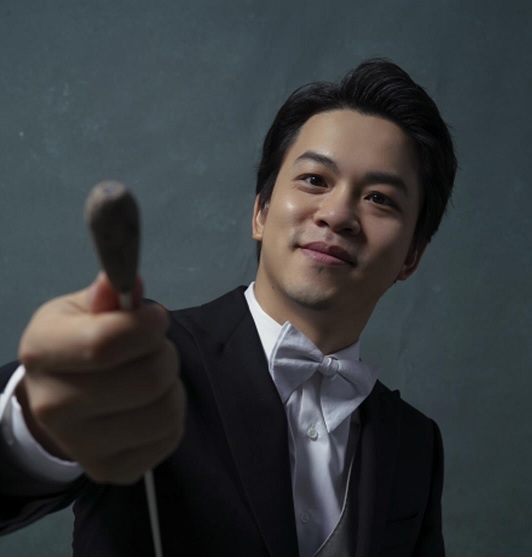
His new conductor at the PPO is the assistant conductor of China Philharmonic Orchestra. He has conducted La Filarmonica Arturo Toscanini, Romanian Radio National Orchestra, Lasi Philharmonic Orchestra, Banatul Philharmonic Orchestra of Timioara, Beijing Symphony Orchestra, and the Sichuan Symphony Orchestra, among others.
The Feb. 24 PPO repertoire includes Antonino Buenaventura’s By the Hillside and Modest Mussorgsky’s Pictures at an Exhibition.
He plays on a 1972 French violin made by Eugene Guinot and Rene Morel courtesy of the Standard Insurance Company.
For tickets, call the CCP Box Office at 8832-3704.
